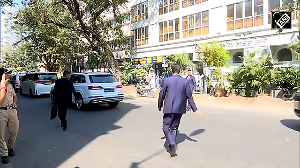The normally aggressive private and foreign banks have by choice remained passive in educational loans. The primary deterrent is the high government interference in this segment of lending business.
The government regulation requires a bank to sanction educational loans to every applicant and there is no discretion allowed.
Leading banks Citibank, ICICI Bank and HDFC Bank do not have educational loan products. Government regulation on educational loans is the biggest hurdle as it prevents banks from assessing applications based on criteria.
UTI Bank and HSBC do have a small presence in educational loans, but they extend only large sized loans over the limits stipulated by the government. The government regulations state that banks should lend without collateral up to Rs 750,000 and with collateral Rs 15 lakh (Rs 1.5 million).
Public sector banks have a 90 per cent market share in educational loans, as they are the most active given their ownership profile. Public sector banks charge 10 to 11 per cent interest on educational loans, while HSBC and UTI charge interest of 11 to 13 per cent.
What also puts bankers on the defensive is the fact that the student who might have borrowed from a bank based in India, could have settled abroad at the time of repayment.
The current delinquency rate is around one-two percent, which rises to five per cent when students go abroad for higher studies.
A public sector banker said, "Education loans are also said to involve more administrative work. Typically, private and foreign banks are shy to indulge into high administrative work for loans of small ticket sizes. They rather prefer to participate in portfolios, which earn higher return on assets."
So while public sector banks cater to loan requirements up to Rs 15 lakh, their private sector and foreign peers look after needs on the higher end of the segment.
With SBI, Andhra Bank and Vijaya Bank being active state-owned players in this segment, HSBC offers loans up to Rs 25 lakh (Rs 2.5 million), while UTI Bank offers the facility of a travel card denominated in the US dollar, the pound sterling and the euro.
As demand for study loans is extremely seasonal, educational loans account for an extremely small proportion of a bank's lending portfolio, pointed out an official from a leading foreign bank.
Thus far, the entire banking system extended Rs 6,130 crore (Rs 61.3 billion), as educational loans to 432,000 students, while banks in the state sanctioned Rs 1,425 crore (Rs 14.25 billion) of the same as on March 31, 2005.
Mushrooming of various business schools, emergence of higher fee-structure of existing professional courses, coupled with the introduction of more unconventional courses are expected to boost potential within this portfolio.




